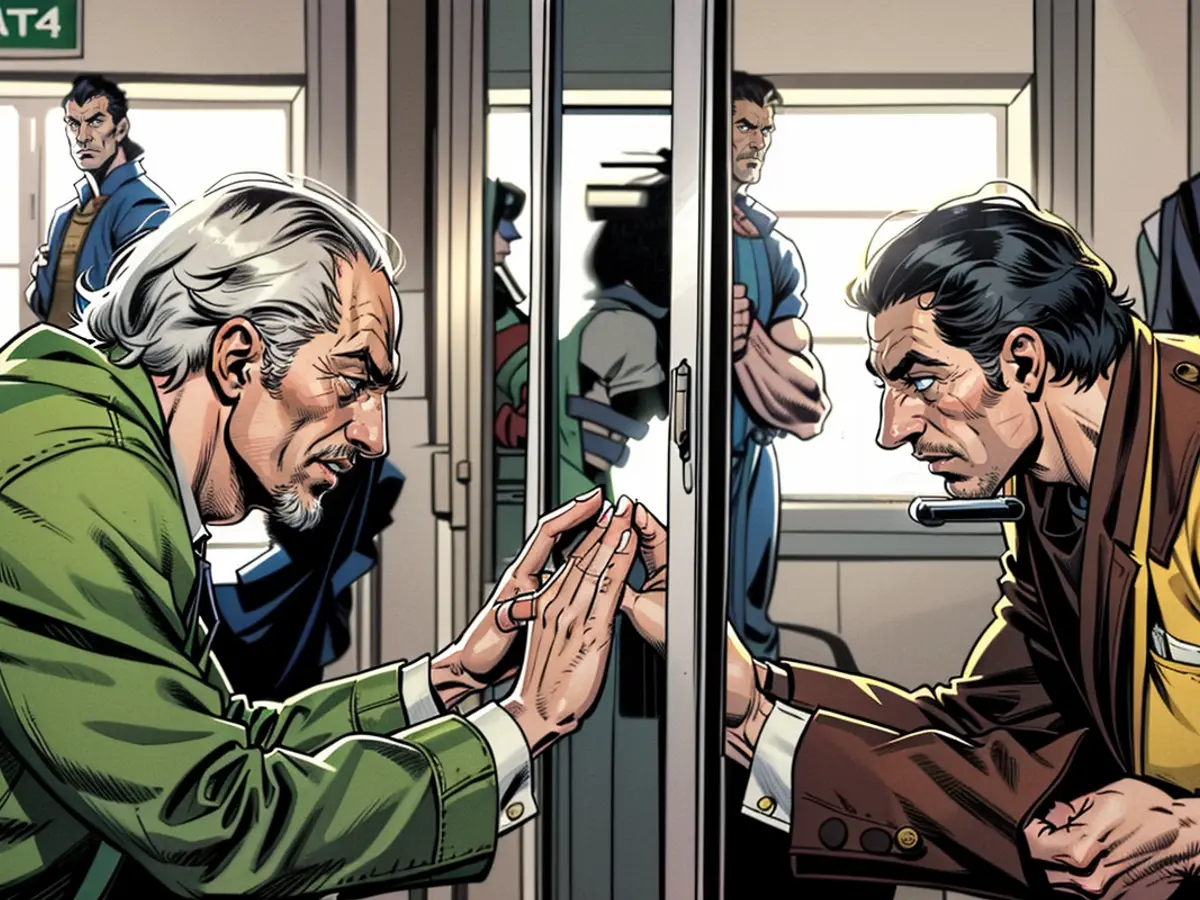Reichsbürger trial - Prince Reuß in the terror trial: A terribly nice noble family
Before the presiding judge opens the hearing, the daughter and father meet before the court audience: Two officials lead Heinrich XIII Prinz Reuss up to the glass partition that separates the visitors from the courtroom. The accused wears a light green jumpsuit over a pink shirt, as well as brown leather shoes. On the other side is the daughter, who suffers from Down Syndrome, surrounded by her mother and aunt. The prince makes faces for his daughter, indicating with his fingers to the ears. He doesn't understand, the glass muffles the sounds. "I have you" – the daughter interrupts. "Tell him," says her mother. "I love you."
One of the spectators – she has been here before – wipes a tear from her eye.
Heinrich XIII Prinz Reuss: Rape of the Mind and Soul?
The admission of Prinz Reuss had been somewhat chaotic a few days ago. He recounted to the tears – charged as the ringleader of a terrorist organization – about his family, his four siblings, and the life of his parents. As a child, the nobleman had allegedly experienced "rapes of his mind and soul" from his peers and teachers due to his name.
Now the court wanted to know why today's accused had spent decades with great enthusiasm trying to get the family's post-war confiscated property back. It's about "compensation," "auction of art objects," "liquidation." But it was never about the money for the prince. Instead, it was an emotional matter. The parents were not coping well with the war consequences and displacement.
He comes from a family where the men are named Heinrich the 27th, Heinrich the 45th, or Heinz Heinrich. The image that the elderly man paints of his kinship is essentially that of a dynasty, characterized by feelings of loss after the war. That's how it sounds in his version.
Prinz Reuss in the Reichsbürger-Process: The alleged ringleader as a caring family father
Sitting quietly next to his lawyer, he tells the court about the "horror story" of the "father's commission": At the time, he was newly married and a father of a young daughter, and he was not clear how complex family matters would become. The weight between the daily business as an entrepreneur to "honor the family" and the familial responsibility had shifted more and more towards restoration. The mother was already old, "I was practically her worker." Only his left foot twitches slightly as he describes the unsatisfactory, previous end of his efforts: Even if he couldn't get the family property back, he had at least created a file for future generations.
The main defendant in the Reichsbürger-Process as a caring family father, who transformed himself in the attempt to alleviate the inherited traumas of his noble lineage?
Since Maximilian Eder, retired Bundeswehr-Colonel, checked into Frankfurt in June, the defendants and their lawyers have been trying to tarnish the image of the defendants as silent and violent enemies of democracy with their soft and personal demeanor.
Maximilian Eder, the former elite soldier, was described by his defender as a "citizen in uniform," having served for 38 years.
Johanna Findeisen-Juskowiak, who is also standing trial as an accomplice in Frankfurt, declared: "If we had more women like our client in Germany, there would be fewer knife attacks." Her lawyer also stated: "This woman is not a terrorist, this woman is absolutely peace-loving."
For hours, Findeisen-Juskowiak spoke about her life in the Waldorf scene at Lake Constance, of musically gifted siblings – cello, trumpet, recorder – of her varied career as a coach or "private assistant" in a dental surgery practice, and of her children: "I am the happiest mother in the world."
The Hippie Life of the Terror Suspects
The story of the terror suspects sounds like it's from a Hippie idyll, as if Pippi Longstocking had somehow ended up in a state protection procedure for inexplicable reasons.
The audience and press were amazed as they spoke of their supposed supernatural experiences, their political career as a candidate for the small party dieBasis, and their belief – deep, although confessional: "in the Good, that love is stronger than darkness, that love and truth prevail, even if it's sometimes dark."
The court listened to all of this, asking in a matter-of-fact tone. Nine people are alone on trial in Frankfurt, with another 17 in Stuttgart and Munich. The personal statements alone – before the accusations of the Federal Prosecutor General are even addressed – will take several trial days.
In light of the ongoing terror trial, the daughter of Prinz Reuss, who is also a defendant in the Reichsbürger trial, expresses her love for her father during the court proceedings. She interjects, saying, "I have you," and her mother urges her to tell him, "I love you."
Prinz Reuss, who is currently on trial as the alleged ringleader of a terrorist organization, has been portrayed as a caring family father in court. His lawyer describes him as a figure who "couldn't get the family property back, but at least created a file for future generations." This portrayal stands in stark contrast to the earlier image of him as the head of a terrorist group.
These two sentences contain the words: ['Terror trial', 'Reuss', 'Reichsbürger trial', 'Reichsbürger raid', 'Reichsbürger group'].







